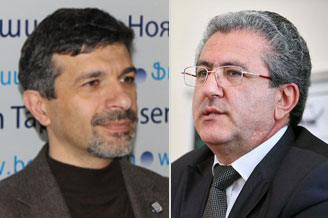In the intelligence unit of The Economist, a London-based newspaper, where the general condition of political culture in 165 states around the world is examined, it is stated that Armenia is at the same level as a set of African states, for example, Mali, Nigeria, or the Democratic Republic of the Congo. Let us also remind that it is the second time in the past week that the Republic of Armenia is compared with African states. A few days ago, Norbert Lammert, the President of the German Bundestag, made a similar comparison in his speech in Yerevan State University (YSU) and stated that we still had to travel a long road before we could become a member of the European Union. www.aravot.am inquired during a conversation with Artak Kirakosyan, the chairman of the Civil Society Institute council, whether the situation in the Republic of Armenia, as far as political culture was concerned, was so bad. Regardless of the article in The Economist, he stated: “We lack a democratic mechanism of decision making, in general. Even in parties or in the way the processes take place in Freedom Square, they don’t include any democratic elements whatsoever. One should have a certain system, which will allow understanding how bottom-up decisions are made. There was hope that at least after this election, that problem will be realized, R. Hovhannisyan would build a new force using democratic mechanisms. However, since we don’t have institutionally mature political organizations, it turns out that we apparently have ideas, but we don’t have institutions, which impedes development. I stress once again that there should be such a system that people will understand how decisions are made, not like R. Hovhannisyan unexpectedly decides that he will write a letter today and not tomorrow, or S. Sargsyan responds to him today and not tomorrow. Basically, we have such an institutional system that there is no such thing as participation.” Garik Keryan, the head of the Department of Political Institutions and Processes, Faculty of International Relations, YSU, in his turn, stated that there were states in Africa that were at different levels of political culture, but it was obvious that the comparison was with the low level. G. Keryan explained it as follows: “Countries in transition, which transform from totalitarianism to democracy, always have problems. For example, the British and the American political culture had a 300-350-year history; naturally, the political culture of the post-Soviet states cannot be compared with that of the West. And in the region, where our country is located, there literally has been no political culture in the past 200-300 years. The region was under the rule of the Ottoman Empire, the Russian Empire, the Soviet Union, and others. Naturally, during 20 years of independence, it is not possible to reach the level of political culture gained in the course of 300 years. Therefore, the comparison of the Republic of Armenia with African states is, to put it mildly, tendentious.” Mr. Keryan thinks that the approach of not seeing the good is wrong, and giving the example of post-Soviet Uzbekistan, Tajikistan, and Azerbaijan, he notes that they are far behind Armenia. In response to a question whether the political processes in Freedom Square and the government’s response to them were in line with the concept of political culture, Mr. Keryan said: “I will assess what is going on in Freedom Square as a protest of a defeated candidate. I don’t see any connection with the political system here. However, it is a plus, and not minus, for the current political system that the defeated candidate is offered an opportunity to express his protest, that force is not used against him, his freedom of expression is not suppressed.”
Tatev HARUTYUNYAN




















































